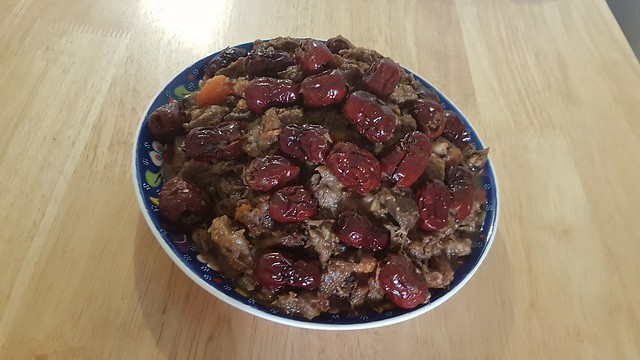Jurjaniyya: The way to make it is to cut up meat medium and leave it in the pot, and put water to cover on it with a little salt. Cut onions into dainty pieces, and when the pot boils, put the onions on it, and dry coriander, pepper, ginger and cinnamon, all pounded fine. If you want, add peeled carrots from which the woody interior has been removed, chopped medium. Then stir it until the ingredients are done. When it is done, take seeds of pomegranates and black raisins in equal proportion and pound them fine, macerate well in water and strain through a fine sieve. Then throw them into a pot. Let there be a little bit of vinegar with it. Beat peeled sweet almonds to liquid consistency with water, then throw them into the pot. When it boils and is nearly done, sweeten it with a little sugar, enough to make it pleasant. Throw a handful of jujubes on top of the pot and sprinkle a little rosewater on it. Then cover it until it grows quiet on a fire, and take it up. Kitab al Tabikh Chapter I (The Book of Dishes, trans. Charles Perry and published as A Baghdad Cookery Book).
Ingredients
For explanations of the ingredients, see the Notes below.
| 1.5kg lamb | 2 tsp coriander seed | 30g pomegranate seed | 2 tsp sugar |
| 3 onions | 1½ tsp cinnamon | 30g raisins | 15mL rosewater |
| 4 carrots | 1½ tsp ginger | 200mL almond milk | 25g jujubes |
| 1½ tsp salt | 1 tsp pepper | 45mL wine vinegar |
Method
- If you are using dried jujubes, put them in a bowl with just enough water to cover them, and leave aside to rehydrate.
- Cut the lamb into roughly equal sized pieces, removing any sinew (the silvery membrane you find on the edges of the meat).
- Put the lamb into a pot with just enough water to cover it, and the salt. Bring to the boil.
- Meanwhile, peel the onions and dice finely.
- Peel the carrots and slice into julienne strips, leaving out the core of the carrot.
- Finely grind the spices in a mortar or electric grinder.
- When the pot with the lamb is boiling, add the onion, carrot and spices. Stir well and reduce to a simmer.
- Meanwhile, put the pomegranate seeds and raisins in a mortar with enough water to cover them, and pound well. This can also be done with a blender. When the mixture has reached a smooth consistency, strain it through a fine cloth to remove any pieces of pomegranate seed.
- When the meat has started to soften and the liquid has reduced a little, add the raisin and pomegranate mix, vinegar and almond milk to the pot and continue to simmer.
- When the liquid has reduced and the meat is falling apart, remove from the heat and add the sugar and the rose water, and mix well. Transfer to a serving platter
- Drain the jujubes if necessary, and pour on top of the meat. Serve warm.
Notes
- The name of this dish derives from Gorgan, a city on the Caspian Sea (Perry, 2005, 31).
- Jujubes (Ziziphus jujuba) are also known as red dates or Chinese dates (the Chinese names are da zao or hong zao – many thanks to Facebook user Andi Houston for the Chinese names), and you may be able to find them dried in Asian grocers. The can also be found in Middle Eastern grocers. They have quite a tart taste, which in this case complements the rich flavour of the lamb and the slight sweetness of the cooking liquid. If you can’t find true jujubes/red dates (and they aren’t the easiest thing to find) do not substitute regular dates, as they are too sweet. I would suggest sliced, red-skinned plums to imitate the taste and colour.
- Stewed dishes such as this often specify “fat meat,” which becomes extremely tasty and succulent when cooked for a long time and slowly, such as in this dish. Look for cuts such as forequarter or neck to get the best results.

Further Reading
Click on the links below to buy direct from The Book Depository.
Perry, Charles (2005). A Baghdad Cookery Book.